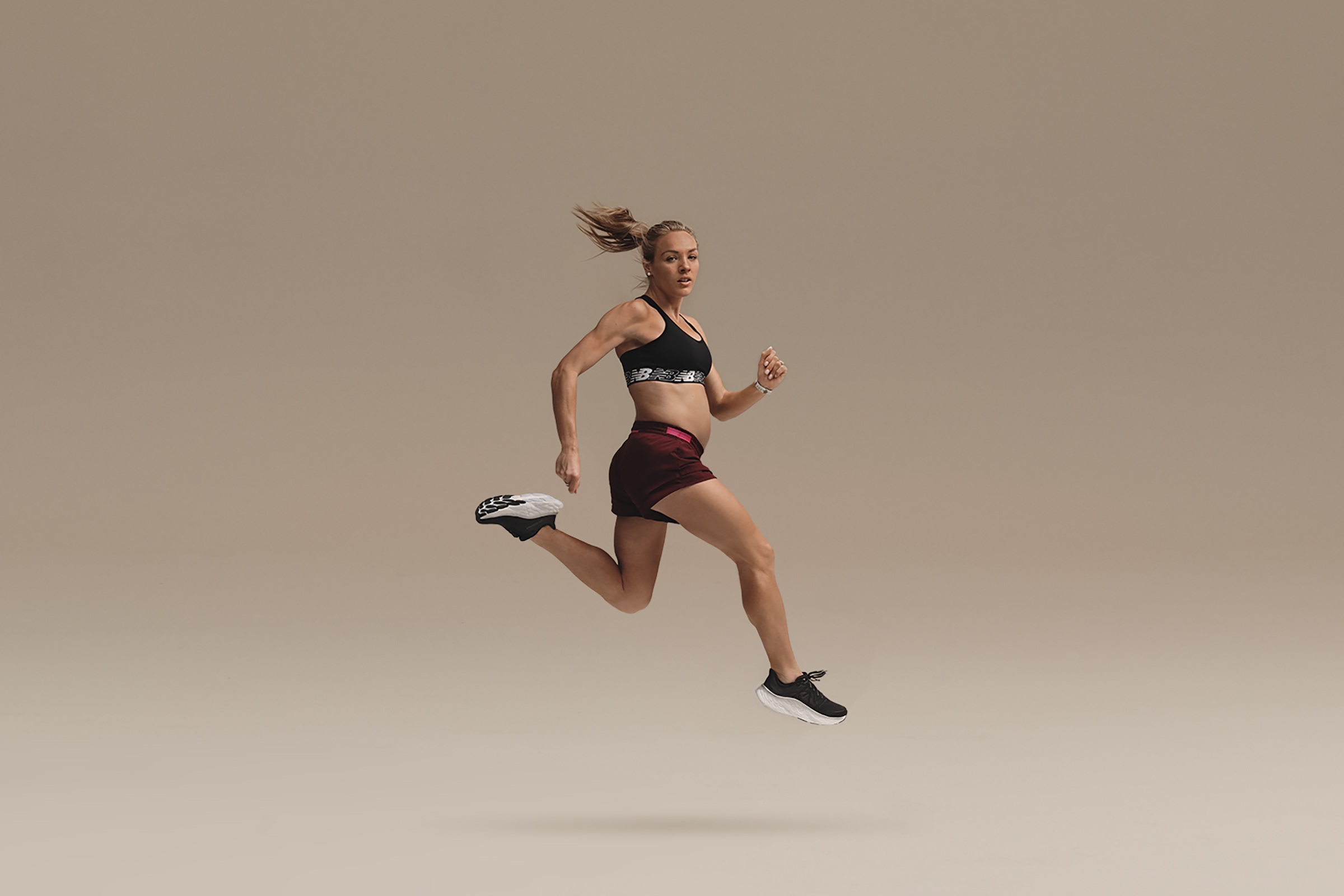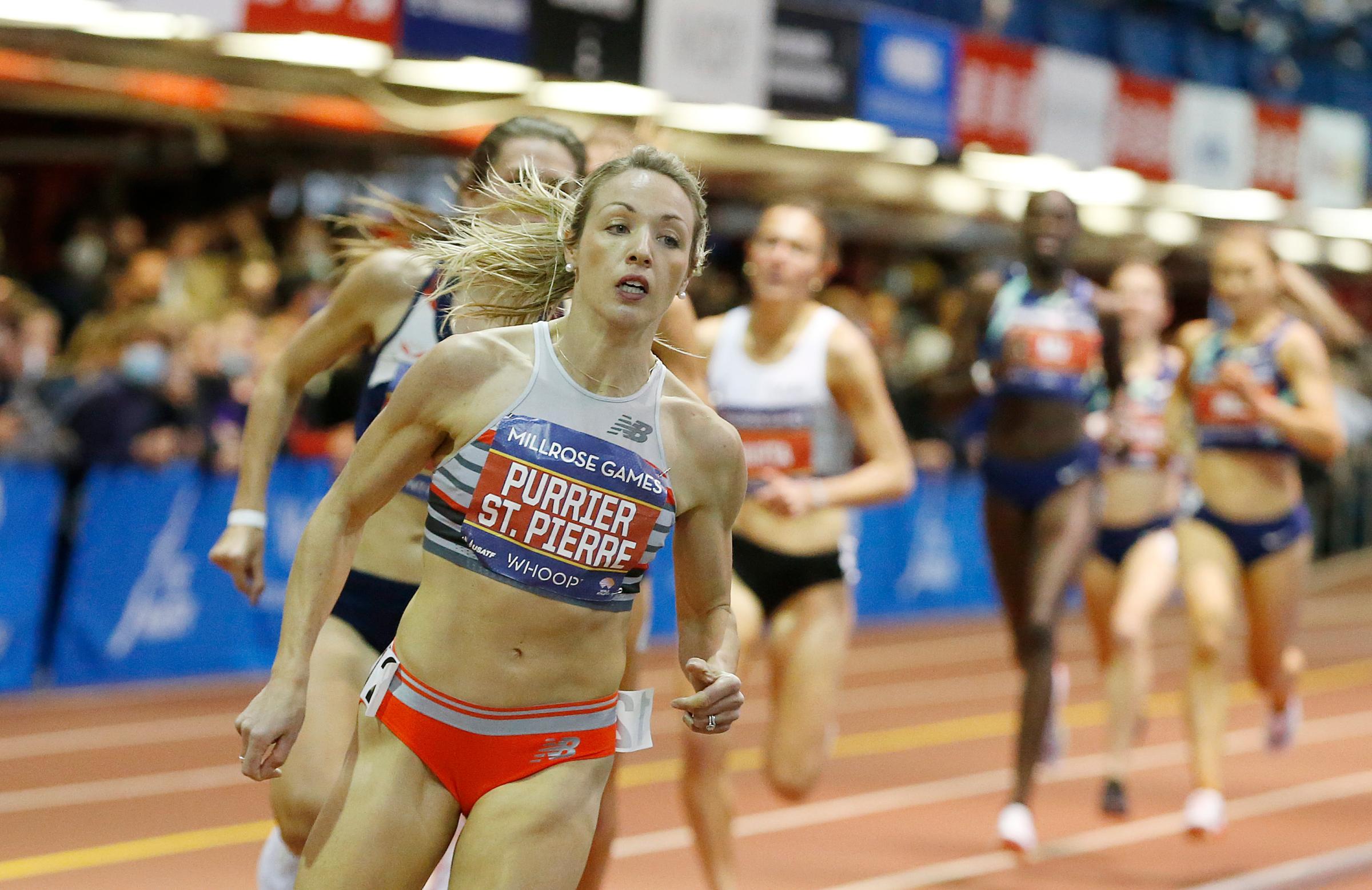
Near the end of a 20-minute conversation on Thursday from her home in Vermont, Olympic middle-distance runner Elle Purrier St. Pierre apologized for feeling a bit tired. She didn’t need to do so, given she could go into labor at any moment.
The holder of the American record in the indoor mile and indoor two-mile, Purrier St. Pierre, 27, announced that she was pregnant last September. In the past, many female athletes, particularly in track and field, felt like they had to choose between starting a family and pursuing their sporting dreams. Purrier St. Pierre, however, hopes to join an emerging class of athletes who’ve embraced pregnancy and returned to compete at a high level.
Purrier St. Pierre and her husband, Jamie, also work a dairy farm in Vermont, where they both grew up. She spoke with TIME about why she wanted to start a family while continuing her athletic career; why she only stopped running a few weeks ago; and the challenges of training while pregnant—especially when nosy strangers give you those looks.
(This conversation has been slightly edited for length and clarity)
TIME: So today is really your due date?
Purrier St. Pierre: Yes.
Wow.
I’m still pregnant.
I’ve been covering sports here for more than 20 years, and can honestly say I’ve never interviewed any athlete, Olympic or otherwise, on her due date. So thank you for this opportunity to do something new. We’d love to share with readers some insight about what you’re going through.
The biggest challenge is just trying to relax and not be so anxious. It’s just the anticipation. The unknown is what drives me nuts. But at the same time, I’m so excited for this next chapter. You’re almost like a kid going to Disney World.
I haven’t been running the last couple of weeks. That’s definitely been a challenge. Running has been different. With my growing belly, I don’t really feel like myself. I’m a capable person, and this belly has definitely slowed me down. At the same time, I have such a greater appreciation for my body, going through this process and being able to bring life into the world. It’s kind of amazing that women’s bodies can do that.
So you only stopped running a few weeks ago. What is the hardest part of running while pregnant?
Progressively getting slower and feeling worse on your runs. I hadn’t been feeling like myself from the start. I didn’t know I was pregnant at USAs [the U.S.A Track and Field Outdoor Championships, in June of 2022]. I didn’t feel good. I felt fine enough to not know that I was pregnant. But I don’t think I ran as best that I could. So it really does take a toll on your body.
It’s just being mentally strong through it. Because I was still able to run all the way up to pretty much the end of my pregnancy. But it just looked different. And so embracing that difference was challenging. But doing that was able to get me through.

Starting a family presents much bigger challenges for female professional athletes than their male counterparts. Some choose to wait until their athletic careers are over before having children. There have been several recent high-profile examples of women returning from childbirth and still enjoying athletic success. Allyson Felix, Serena Williams, and Alex Morgan come to mind. Was it a struggle for you to make that decision to have a family now? What ultimately made you comfortable with making that choice?
It’s definitely a really personal decision. In a way, I feel like I didn’t make the decision. I just followed my heart. It was a piece of me that has been missing, that I’ve wanted in my life for so long.
But ultimately, it was a decision. I gained confidence from seeing other athletes do it. I don’t think that comes lightly. It used to be a lot harder, but now we have a lot more resources and a lot more support than we used to.
I really believe that this is going to make my career last longer. Because I wanted this so badly. And if I was to wait and do it later when I was older, it might have been harder to come back or my career might have been cut shorter. You never know how long you’re going to run. It’s not a secret that I’m not going to be running these times when I’m 50 years old.
I’m not going to say I didn’t try to plan it around the Olympics [in 2024, in Paris]. That’s still something that people take into consideration. But yeah, there are just a lot more women doing it now.
You’ve mentioned there’s more resources available to female athletes now. But that hasn’t always been the case, particularly in track and field. A few years back, Felix, for example, felt compelled to hide the early stages of her pregnancy from her shoe sponsor. Were you afraid to tell your coach or your sponsors about your pregnancy?
My coach was the first person that I told. I guess I was a little nervous to tell him because it was in between USAs and Worlds. But he was so supportive. The first time that I told him, he’s like, “that’s great, you and Jamie should be so excited.” I feel really fortunate having such a great sponsor that has supported me through this. The vice president of running [at New Balance] sent me a personal message when he found out that I was pregnant. It was nothing about running. It was like, “I just heard the great news, congratulations.” He was telling me to enjoy this time in my life. That’s a big step.
[Purrier St. Pierre will be featured in New Balance’s “Run Your Way” brand campaign—launching broadly in mid-March— that celebrates runners of all shapes and sizes.]
Read More: Motherhood Could Have Cost Olympian Allyson Felix. She Wouldn’t Let It
The World Championships are in Budapest this summer, in August. Ideally, how soon after giving birth do you want to be training again?
It’s really hard to tell. I have to make plans with my doctor, depending on how labor goes. I think I’ll slowly build back up. I don’t think I’m putting any limits on anything. I’m really just focusing on bringing this baby into the world right now. But after that, the biggest goal is going to be the Olympics. I’d like to have a smaller season this summer and see what I’m able to do. But I’m not putting high expectations on anything this summer.
What’s it been like working on the dairy farm while pregnant?
I’ve been working at the farm a bit more since I haven’t been training and traveling as much. That’s something that’s actually been able to help me a lot through this pregnancy. I really like to stay busy. So when I haven’t been lifting as much and running as much, I’ve had more time to do these other things. It’s helped me stay mentally healthy, working at the farm and being busy and making a difference there. It is kind of like a double life that I live. It’s been pretty nice to be home a little.
You may have heard: parents can be quite judgmental of other parents! So as an expecting parent who only stopped running a few weeks ago, were there relatives or friends or just strangers questioning your commitment to push yourself? Did you encounter judgment?
Definitely. People just make a lot of comments. Just being pregnant, it opens the door, for whatever reason, for people to make comments.
I’ve heard people talk about that. And I never really experienced it. Now I have and I know how it feels. It’s a really sensitive time in your life. You don’t want to feel judged. But you have to at the end of the day know that you’re making the best decision for yourself and your baby and just be confident in that. As a runner, I’ve learned how to listen to my body and know the cues and know what’s right. I’ve carried that through my pregnancy and I’ve made so many adaptations to this body right now.
What kind of adaptations?
Well, running less. I was able to run an hour a day pretty far into the fall. I just slowly have kind of phased out. Doing things differently in the gym. Not using certain muscles. I can’t use certain muscles in my stomach right now.
But I feel like people have always wanted to protect pregnant women. It comes from a good place. But everybody’s different. You can’t just have one size fits all. Just because you couldn’t run when you were pregnant doesn’t mean that somebody else can’t. It doesn’t mean that it’s not healthy. That goes for not just running, but for any other kind of physical activity or job—pregnant women should still be able to do it without being judged.
Any final takeaways you’d like to share?
Listen to your body and do what makes you happy. You can’t just cut everything out of your life. You have to do it in smaller steps. I don’t have all the answers. This is my first pregnancy, but here I am at 40 weeks. I made it through. I still have a long way to go and I would just say, lean on your support group.
This is what my grandma always says to me. She’s like, “people have big opinions about what pregnant people should and shouldn’t do. But if you’re a runner then and you’re pregnant, then you’re still a runner. If you ride horses and you’re pregnant, you can still ride horses.”
I wouldn’t say take up riding horses. Maybe that’s not the best example. [Laughs] You have to do what you do when you’re pregnant. Because mentally, that’s who you are. You can’t just completely change your identity.
Last thing: babies are smart, right? Their brains learn language and process the world around them, even though we often can’t tell that it’s happening. So assuming your son can hear you right now and understand you, is there anything you’d like to say to him right now?
I talk to him sometimes, I guess. I would just tell him to be strong—and we’ll see you soon.
So not “come out already?”
He’s getting an eviction notice here pretty soon.
More Must-Reads from TIME
- Cybersecurity Experts Are Sounding the Alarm on DOGE
- Meet the 2025 Women of the Year
- The Harsh Truth About Disability Inclusion
- Why Do More Young Adults Have Cancer?
- Colman Domingo Leads With Radical Love
- How to Get Better at Doing Things Alone
- Michelle Zauner Stares Down the Darkness
Write to Sean Gregory at sean.gregory@time.com